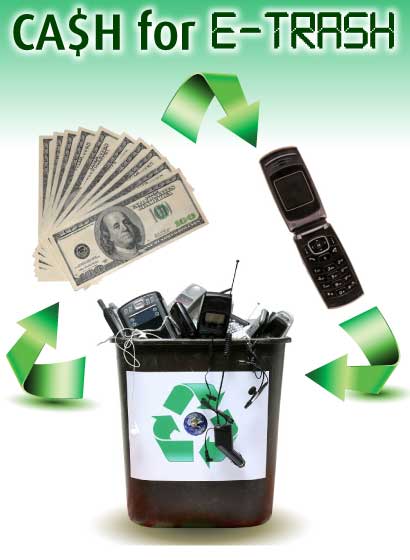by Missy Strauss
E-waste is a term describing electronics at the end of their useful life. Electronics encompass anything from cameras to clocks, cell phones to laptops. E-waste is a major concern for multiple reasons, one of the most important being that it’s a relatively new waste stream and has grown in volume exponentially in a very short period of time. Consider this: 15 years ago cellular phones were just becoming mainstream, still in the mass marketing development stage. Today about 50 million cell phones are replaced worldwide each month, and only 10% are recycled world-wide.
It is estimated that the U.S. now dumps between 300 million and 400 million electronic items per year, and less than 20% of that e-waste is recycled. Even more concerning is that E-waste represents 2% of America’s trash in landfills, but it equals 70% of overall toxic waste. The extreme amount of lead in electronics if allowed to degrade into the ground or leach into groundwater can cause damage in humans to the central and peripheral nervous systems, the blood and the kidneys.
The good news is that lead can also be extracted from a device and reused. Other commodities that can be extracted from electronic equipment and reused as valuable raw material in the manufacture of new products are steel, aluminum, gold, silver, titanium, copper, nickel, plastic and glass. It only makes sense to recycle electronics: extract all reusable materials saving money, and making certain that toxins are being properly handled and reused or disposed, saving our planet.
Electronics recyclers provide comprehensive recycling operations. Businesses usually have large amounts of e-waste that may require secure data destruction. There are both for-profit organizations that may pay for them, and nonprofits, such as ARC Broward, that will provide you with secure hard drive and data destruction, as well as a receipt for a tax deduction.
Individuals can get paid to recycle electronics and keep them out of landfills, too. Instead of tossing your gadgets in a landfill when you’re finished with them, get paid to recycle them by using services like www.getpaid2recycle.com, www.buymytronics.com, and www.gazelle.com. E-recyclers will recycle or refurbish your electronics, keeping them out of landfills and paying you cash. Different recyclers take different types of products, so make certain that you do your research online to see which recycler is willing to give you the best price. And please, whatever you do, make certain your recycling company of choice is certified by R-2, ISO or another reputable third party verifier, insuring the organization is truly disposing of your e-waste properly.
And there you have it: one simple way that you can reduce your clutter and make a few bucks on in the process, almost hassle free! And that’s it, for the TangibleGreen Tip!

